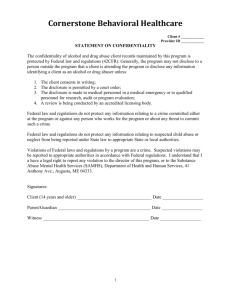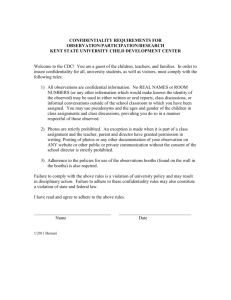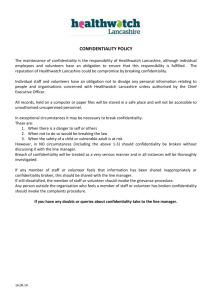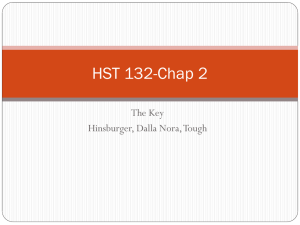Staffing arrangements: viii. Confidentiality: students and staff Policy
advertisement
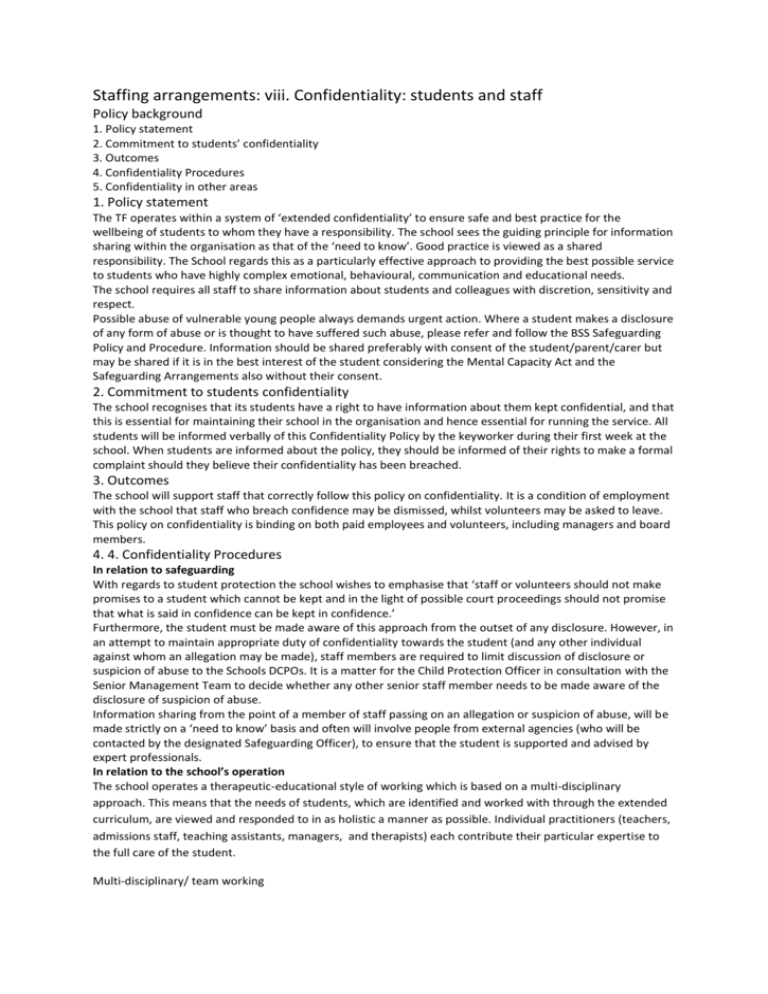
Staffing arrangements: viii. Confidentiality: students and staff Policy background 1. Policy statement 2. Commitment to students’ confidentiality 3. Outcomes 4. Confidentiality Procedures 5. Confidentiality in other areas 1. Policy statement The TF operates within a system of ‘extended confidentiality’ to ensure safe and best practice for the wellbeing of students to whom they have a responsibility. The school sees the guiding principle for information sharing within the organisation as that of the ‘need to know’. Good practice is viewed as a shared responsibility. The School regards this as a particularly effective approach to providing the best possible service to students who have highly complex emotional, behavioural, communication and educational needs. The school requires all staff to share information about students and colleagues with discretion, sensitivity and respect. Possible abuse of vulnerable young people always demands urgent action. Where a student makes a disclosure of any form of abuse or is thought to have suffered such abuse, please refer and follow the BSS Safeguarding Policy and Procedure. Information should be shared preferably with consent of the student/parent/carer but may be shared if it is in the best interest of the student considering the Mental Capacity Act and the Safeguarding Arrangements also without their consent. 2. Commitment to students confidentiality The school recognises that its students have a right to have information about them kept confidential, and that this is essential for maintaining their school in the organisation and hence essential for running the service. All students will be informed verbally of this Confidentiality Policy by the keyworker during their first week at the school. When students are informed about the policy, they should be informed of their rights to make a formal complaint should they believe their confidentiality has been breached. 3. Outcomes The school will support staff that correctly follow this policy on confidentiality. It is a condition of employment with the school that staff who breach confidence may be dismissed, whilst volunteers may be asked to leave. This policy on confidentiality is binding on both paid employees and volunteers, including managers and board members. 4. 4. Confidentiality Procedures In relation to safeguarding With regards to student protection the school wishes to emphasise that ‘staff or volunteers should not make promises to a student which cannot be kept and in the light of possible court proceedings should not promise that what is said in confidence can be kept in confidence.’ Furthermore, the student must be made aware of this approach from the outset of any disclosure. However, in an attempt to maintain appropriate duty of confidentiality towards the student (and any other individual against whom an allegation may be made), staff members are required to limit discussion of disclosure or suspicion of abuse to the Schools DCPOs. It is a matter for the Child Protection Officer in consultation with the Senior Management Team to decide whether any other senior staff member needs to be made aware of the disclosure of suspicion of abuse. Information sharing from the point of a member of staff passing on an allegation or suspicion of abuse, will be made strictly on a ‘need to know’ basis and often will involve people from external agencies (who will be contacted by the designated Safeguarding Officer), to ensure that the student is supported and advised by expert professionals. In relation to the school’s operation The school operates a therapeutic-educational style of working which is based on a multi-disciplinary approach. This means that the needs of students, which are identified and worked with through the extended curriculum, are viewed and responded to in as holistic a manner as possible. Individual practitioners (teachers, admissions staff, teaching assistants, managers, and therapists) each contribute their particular expertise to the full care of the student. Multi-disciplinary/ team working All therapists and professionals involved in the care of students will be bound by their professional organisation’s own Code of Conduct. Differing expectations and obligations can generate problems and conflicts in the area of confidentiality, particularly for counsellors and psychotherapists. Section B.3.1 of the BACP Code of Ethics and Practice for Counsellors (1998) states that: ‘Confidentiality is a means of providing the client with safety and privacy and thus protects client autonomy. For this reason any limitation on the degree of confidentiality is likely to diminish the effectiveness of counselling’. It is common practice, however, when a practitioner works within an agency or organisation, for confidentiality to be held within the agency rather than by the counsellor/therapist. Effectively this means working in the context of ‘confidentiality within the team’ (Gerald, D. and Gerald, K. (1999) ‘Counselling Adolescents’, Sage Publications, London, p. 82). The information kept about students is held in Student Records and is for use only within the organisation on a ‘need to know’ basis. These records are protected by the Data Protection Act. 5. Confidentiality in other areas The responsibilities of employees/volunteers All staff must follow the policies and procedures detailed in this document. This is a condition of service in the organisation and breaches of it may lead to dismissal, or being asked to leave. Educational Information Information about the student’s educational progress, including social and emotional wellbeing will be discussed with parents, legal guardians and social services, unless the student is 18 years old or over and has explicitly instructed the College/School not to share this information. Information obtained other than through work in the organisation The school will seek permission from each student for the sharing of relevant information on a strictly ‘need to know’ basis as part of the admissions procedure. General information about student background is available to all staff and is shared through the Student Profile. The profile is prepared and circulated before the arrival of the student to udent’s needs Reports, student information, correspondence and any other documentation from other agencies will be held both on computer and in individual paper files held in a secured environment. This information may be subject to Data Protection and formal information sharing arrangements. This information is accessible to Tutors and residential staff on a ‘need to know’ basis and will be signed out to be read only within the confines of the college premises. Information may not be reproduced without the express permission of the Head Teacher. Given that part of the Medical Record is held at the school, express permission for the reproduction of this medical information has to be obtained from the registering GP or the school’s doctor or nurse. Information obtained or accumulated during the course of the students placement Reports, correspondence, case review notes and any other documentation will be held on computer and in individual paper files held in a secure environment. Consideration must always be given to the extent of disclosure of any personal information. It is often not appropriate (or relevant) to disclose more than a minimum of information for the purpose of the information sharing arrangement. All information held by the school is subject to Data Protection and formal information sharing arrangements. Medical information Medical notes relating to consultations provided by the school’s doctor or nurse are held securely and separately. This information is accessible to individual therapists, and the school’s Senior Management Team on a ‘need to know’ basis as deemed appropriate by the school Doctor or Nurse but will require his/her permission. The information will be read in the place where it is stored. Counsellors, therapists and multi-disciplinary working Counsellors and other therapists are sometimes requested to write reports as to whether the students engage in sessions Practitioners operating within the ethos of multi-disciplinary working are required to accept that ultimately confidentiality is held within the agency rather than by the individual counsellor/therapist. Effectively this means working in the context of ‘confidentiality within the team’ and relates to the school’s duty of care to the student concerned (Gerald, D. and Gerald, K. (1999) ‘Counselling Adolescents’, Sage Publications, London, p. 82). Counsellors/therapists are expected to share information with the school via the Senior Management Team where issues of risk or Health and Safety are identified. From time to time multi-disciplinary teams are expected to share sensitive information. This information should only be disclosed where professionals deem it in the individual student’s ‘best interest’ (This usually relates to the risk of self-harm, harm to others, medical emergency/issues, risk or perpetration of physical, sexual and/or emotional abuse or bullying). Staff are expected to take into account issues of respect and confidentiality when talking about students, colleagues and third parties. Information kept about students is held in Student Records and is for use within the organisation on a strictly ‘need to know’ basis. Such records are subject to the Data Protection Act. Transferal of information between agencies Care should be taken to ensure that information is accurate and/or that the status of the information is indicated. For example, the time period to which the information refers should be indicated, opinions should be identified as opinions, and the person holding the opinion should be identified. All reasonable efforts should be made to check the accuracy of the information with the student or some other source. Where confidential information is transferred by post it should be clearly addressed to the person who has the right to receive it, and marked confidential; where communicated by phone, it should be given only to the person authorised to receive it. Information should be transferred only on a ‘right to know’ and a ‘need to know’ basis. The confidentiality of third parties When disclosing information about one person, due regard should be given to protecting the confidentiality of others. The student’s rights of access to information No information which is recorded about a student is confidential from that student, and all students have a right to see information recorded about them unless such information compromises the confidentiality of a third party. Students wishing to see information that the school holds on them, will need to request access to the documents in writing to the Senior Management Team. In the case of health, education and social work records, client or data subject access can be denied where it would cause the student or other party ‘serious harm’. Serious harm relates to the physical or mental health of either the data subject or a third part (Bor, R., Ebner-Landy, J., Gill, S. and Brace, C. (2002), ‘Counselling in Schools’, Sage, London, pp. 146-147). For this reason information should be scrutinised before being shared, in order to avoid causing ‘serious harm’ to the student and others. Reference to Regulations and Standards The Education (Independent School Standards) (England) Regulations, 2010 (Amendments 2012, 2014) Part 3 WH+S, paragraphs 7 & 8 Policy Sign off and review By whom Policy signed off by Reviewed by Next Review By Julia Low Marion Veal Julia Low Date 13.7.15 13.7.15 13.7.16




